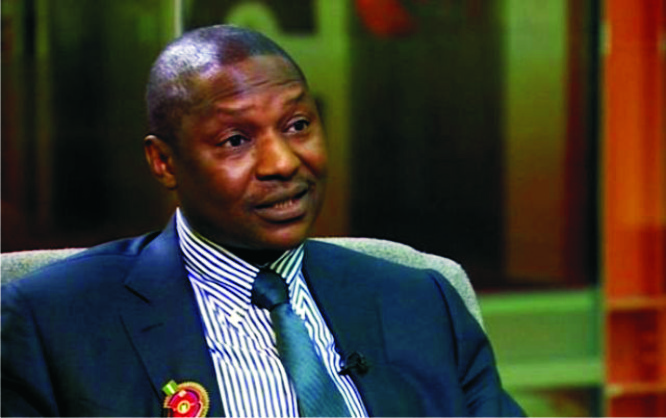Editorial
Recovered Assets’ Agency

Last week, the Attorney General of the Federation, AGF, and Minister of Justice, Malam Abubakar Malami (SAN) disclosed that the Federal Government has approved a new bill, the Proceeds of Crime Recovery and Management Agency Bill, for onward transmission to the National Assembly.
According to the AGF, the bill, which was first conceived in 2007, and rejected by the Federal Executive Council, FEC, of successive administrations, including the current cabinet before it was eventually approved, is geared towards securing a legal and institutional framework that will assist in harnessing proceeds of crimes that are currently scattered across several government agencies and bring them into one agency.
The Tide views this development as a pragmatic strategy in the Federal Government’s fight against corruption and commends the move as a positive one in the right direction. The initiative, we believe, will breathe a measure of air of people’s confidence in the crusade against corruption, which has been the fulcrum of the present administration’s agenda.
We are also happy to note the recent launch of the Central Database on recovered asset and the Central Criminal Justice Information System by the government. The database and information system will, no doubt, ensure transparency and accountability in the management of recoveries from proceed of crimes.
That these initiatives would help promote transparency, better information flow and management is not in doubt, or the impact it would have regarding accountability and trust, as far as recovered assets are concerned.
It is an open secret that public distrust and suspicion have trailed the fight against corruption and the subsequent announcements of recovered or seized assets. Indeed, Nigerians could not whole-heartedly vouch for the sincerity of government and safety of such assets and the situation went a long way to raise more questions than answers over the operations and candour of the anti-graft agencies and their personnel.
There have been numerous questions and calls by Nigerians regarding the exact figure and status of recovered loot by the anti-graft agencies, especially, under the present administration.
That is why we think that the National Assembly should as a matter of national importance consider the Recovered Assets’ Agency Bill and ensure its speedy passage. Passage of the bill and coming into effect of the agency, we believe, will not only ensure uniformity of process and real time access and information feeding, it will put Nigeria on safe pedestal with her membership of international organisations, inclusive of financial action task force, and openness targeted at deepening transparency within the context of United Nations Convention Against Corruption.
In addition, we are convinced that such agency would help block leakages and promote transparency in government. Importantly, also, effective tabs would be in place to secure recovered assets without any room for happenstance, while information on such assets would easily be accessed by Civil Society Organisations, CSOs, Non-Governmental Organisations, NGOs, the media, researchers and ordinary Nigerians. This will, at all times enable the people, particularly, the CSOs to be on the same page with government as far as the status and management of recovered assets are concerned, thereby engendering mutual trust and confidence.
With the agency on board, Nigeria can be in more productive synergy with other developed and transparent countries based on the existence of world accepted best practices.
However, in establishing the agency and choosing the personnel, especially, the management cadre, it is pertinent to ensure that due diligence is observed. It must not be a job for the boys or an opportunity for political, selfish and sentimental considerations. The task should be for not only the eminently qualified and capable individuals, but persons with impeccable antecedents to be able to live up to the demands of the office.
We expect that the agency should be set up and empowered in such a way that it would have internal-check mechanisms, be professional, independent and strong enough to keep a leash on other anti-graft agencies like the Economic and Financial Crimes Commission (EFCC); Independent Corrupt Practices and other related offences Commission (ICPC); and others.
This, we believe, will make the agency effective, accountable and ensure that recovered funds and assets are not relooted one way or another. The Federal Government and the National Assembly must ensure that no effort is spared to put the agency in place within the shortest possible time with all recovered assets put under its custody.
It is indeed time to put the fight against corruption on the table and make sure that it passes through and survives integrity and transparency test in Nigeria.
Editorial
Task Before New Defence Minister
Editorial
HYPREP And The Collapsed Water Tank

Editorial
Resurgence Of Illegal Structures In PH
-

 Business4 days ago
Business4 days agoCBN Revises Cash Withdrawal Rules January 2026, Ends Special Authorisation
-
Business4 days ago
Shippers Council Vows Commitment To Security At Nigerian Ports
-

 Business4 days ago
Business4 days agoNigeria Risks Talents Exodus In Oil And Gas Sector – PENGASSAN
-

 Business3 days ago
Business3 days agoFIRS Clarifies New Tax Laws, Debunks Levy Misconceptions
-
Sports3 days ago
Obagi Emerges OML 58 Football Cup Champions
-

 Politics3 days ago
Politics3 days agoTinubu Increases Ambassador-nominees to 65, Seeks Senate’s Confirmation
-
Business4 days ago
NCDMB, Others Task Youths On Skills Acquisition, Peace
-

 Sports3 days ago
Sports3 days agoFOOTBALL FANS FIESTA IN PH IS TO PROMOTE PEACE, UNITY – Oputa

